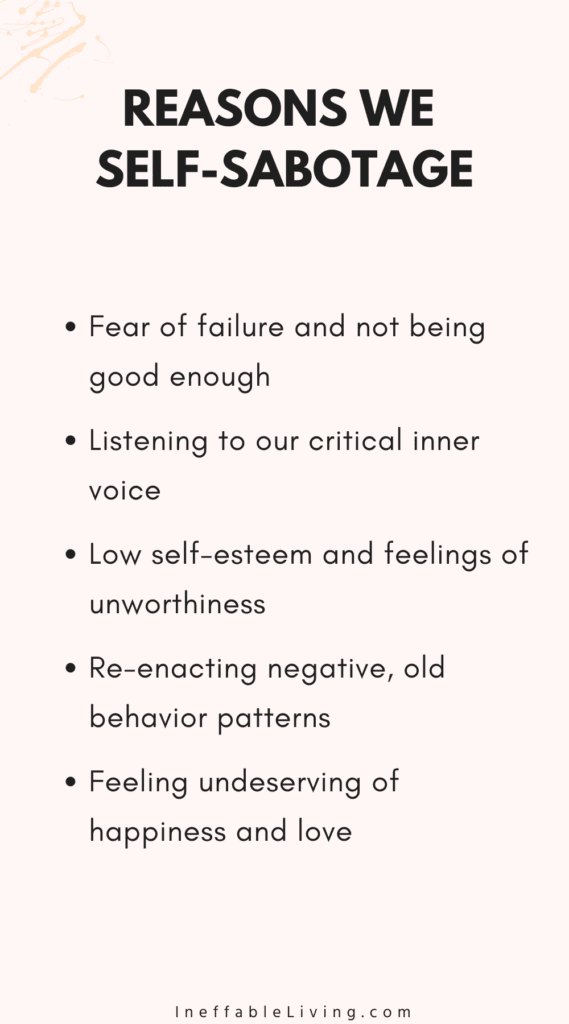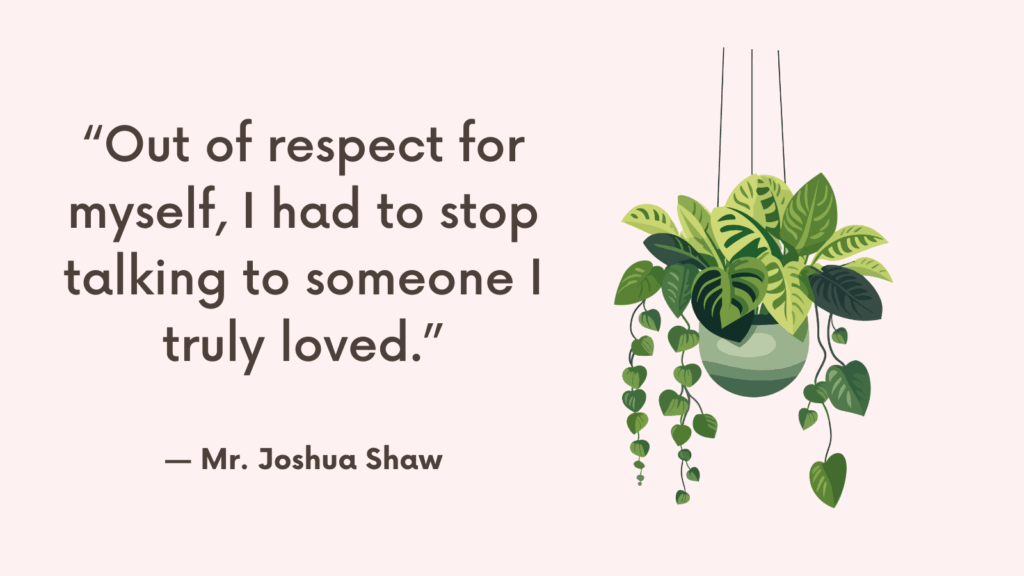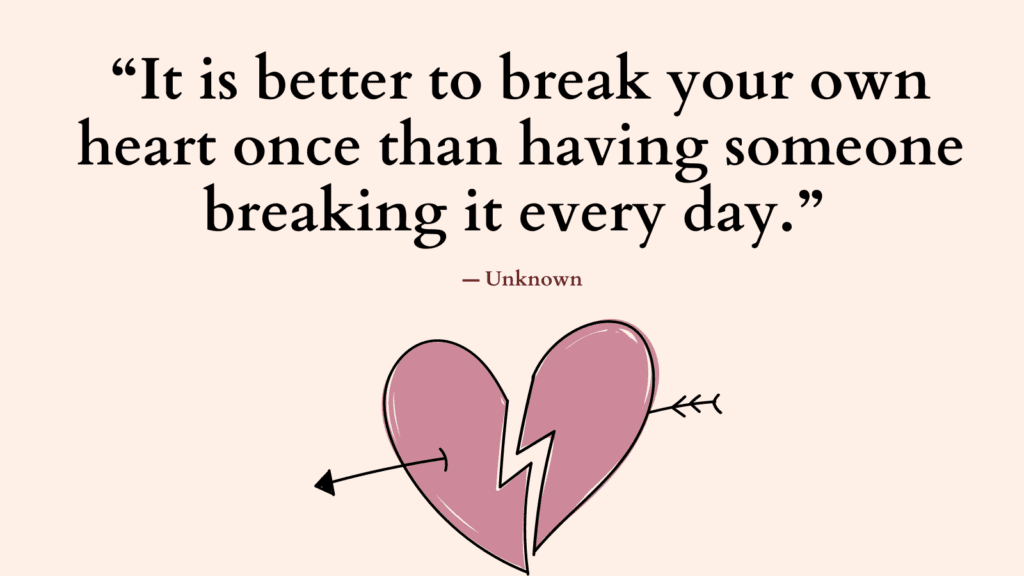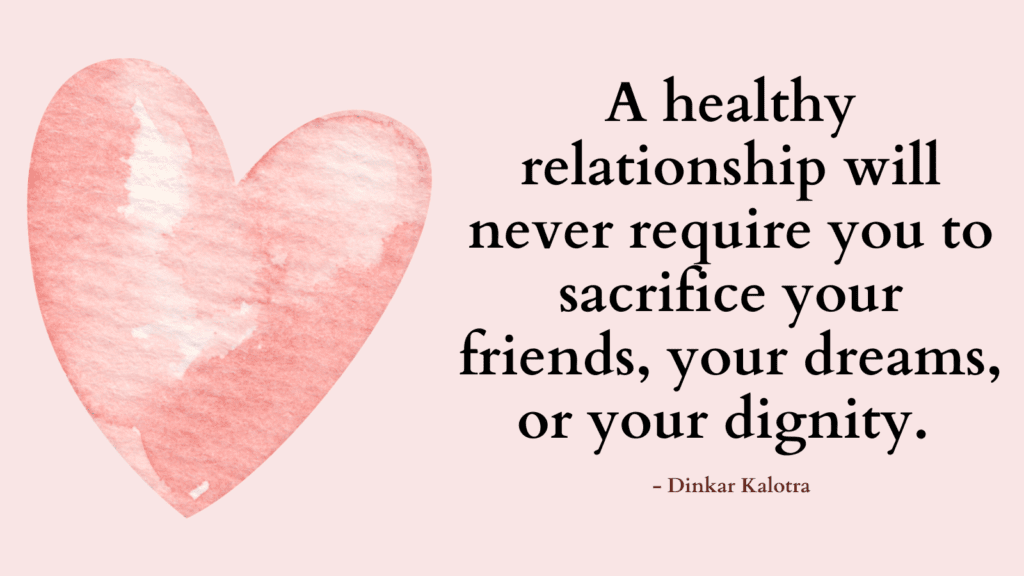Today, you’ll learn how to move on from a divorce you didn’t want using 17 strategies that will make grieving your divorce less painful.
None of us think, when getting married, that one day we will find ourselves among those who make up 50 percent of the divorce rate.
However, we may find ourselves having to face the end of a marriage.
As devastating as a divorce, or even a breakup can be, it’s still possible to part ways with as little damage as possible.
Why Do Couples Get Divorced?
There are many reasons why people would get a divorce, the following are some common ones:
1. One of both partners have behaved in a way that violates the agreements the relationship is founded upon
Such behaviors may include cheating, drinking excessively or engaging in other destructive addictions.
2. Ineffective or destructive communication
This is when even after trying to fix things, one of both partners chronically feel diminished, misunderstood or not heard.
The relationship is characterized by a built-up resentment as a result of the fundamental disregard for the feelings and needs of each partner.
3. Partners grow in different directions
Over time, people’s core values begin to shift and unlike previous generations that valued stability, and fidelity, we are aspiring today to grow and realize our full potential.
When partner don’t grow together, they may grow apart.
Before You Throw In The Towel
Before you decide you want to part ways, consider the following:
1. Seek professional help
Even if you feel quite certain that you want to leave your partner, schedule an appointment with a professional (licensed counselor or therapist) to discuss it before you approach your partner about it.
Put aside your decision aside and keep an open mind to explore the possibilities of working out your problems rather than breaking the union prematurely.
2. Share your feelings with your partner without shaming or blaming them
Many people choose to skip this step and righteously announcing their departure.
You probably have been fighting and complaining for a while, but for your partner that may not be a good enough reason to part ways and the idea of getting a divorce may come to them as a shock.
It’s also important to let the other person the chance to address or fix the problem.
Related: How to Be More Effective in Relationships (Effective Communication)
What Is Grief?
Grief is a normal and natural reaction to the loss of any kind, including a divorce.
Although grief is the most powerful of all emotions, we have been socialized to believe that our emotions are abnormal and unnatural.
Grief is especially overwhelming because of the conflicting emotions it involves.
For example, after a divorce, you may feel a sense of relief that the battles are over. This is a positive feeling.
At the same time, you may be left with feelings of emptiness and fear that you will never find someone else.
These conflicts are also natural responses to loss.
Related: Dealing With Grief and Loss: 12 Lessons You Learn From Grief (+Grief Recovery Plan)
Stages of Divorce Grief
Many people are familiar with the work of the five emotional stages – denial, anger, bargaining, depression, and acceptance – that Dr. Elisabeth Kubler-Ross.
However, many don’t know that these stages were meant for a dying person after being diagnosed with a terminal illness.
This is why these stages may not apply to grief that arises after loss. You may not feel anger or denial after a loss and you may oscillate between two stages.
Not experiencing all of these stages and in a linear way doesn’t mean that you’re doing it wrong.
Related: Recovering From Grief: How to Get Back to Life After Loss

How to Move on From a Divorce You Didn’t Want?
If after doing all you can to make the relationship work, you decided that a divorce is the best option, consider the following suggestions:
#1. Let Go of Feelings of Shame
Failure is just another name for much of real life.
– Margaret Atwood
Most people assume that if a romantic relationship ends for any reason other than one or both people die, then that relationship was a failure.
This is one of the main reasons why people feel ashamed about getting a divorce.
The loss of love is hard enough, without the added shame that can come along with it.
To let go of feelings of shame, you need to first challenge this assumption.
Rather than assuming that divorce or breakup is just another word for failure, consider the things you’ve given to your former partner and to the community as a result of your union and the damage you would stop through the divorce.
Related: How To Let Go Of Shame After Trauma?
#2. Reach Out For Support
A divorce or a breakup is when we need connection the most, but it’s also a time when we feel the urge to isolate and save face the most.
Another great way to face feelings of shame is to do the opposite of what shame is urging you to do – run away and hide – and reach out for support.
Allow your friends and family to be there for you while you adjust to your new life.
Difference Between Guilt and Shame
Guilt…
is something we feel when we violate our own core values, by doing something that is fundamentally bad and wrong in our perception.
Shame…
is what we feel when we violate external rules and expectations that society imposes upon us, leaving us feeling that we are fundamentally bad and wrong.
Related: Best 9 Tips On How To Receive More In Life And Relationships?
#3. Change Your Expectations
Studies show that when our expectations are in line with reality, our brain is rewarded with a dopamine rush.
Yet when our expectations do not match our vision of what we think should happen, our cortisol (the stress hormone) levels rise, shifting our brains into a threat state.
As you change your expectations of how a romantic relationship should go, and begin to accept the reality of your divorce or breakup, your stress levels will go down.
Change the way you define the value of your relationship from “How long did it last?” to “What wisdom have I gained that I can now apply moving forward?”
Related: How To Stop Self-Critical Thoughts Using These Top 10 Techniques
#4. Be Aware of Your Intense Emotions
In her TED Talk, Dr. Helen Fisher describes the irony of what happens in our brains after being rejected by the one we love.
She explains that the part of the brain that became activated when we first fell in love is the exact same part that becomes even more stimulated when we are rejected.
As a result, rather than turning our attention toward moving forward and starting a new life, we remain entangled, as we desperately are trying to win back the affections of our beloved.
Being rejected can cause what’s called love withdrawal – a similar reaction to that of a cocaine addict agitatedly seeking the next fix.
This may trigger reckless and destructive impulses.
Breakups can be so painful that some may feel suicidal. If you find yourself wanting to hurt yourself, please call the Suicide Hotline at 1-800-273-8255.
Related: 9 Steps You Can Take Today To Reclaim Control Over Your Emotions
#5. Keep In Mind That Hating Your Ex May Help, But Only Momentarily
Hating someone you’ve loved to try to remove them from your psyche may bring you the relief that you seek, but only momentarily.
Eventually, you’ll become resentful and your heart will become closed and hardened.
Unlike what most people believe, love’s opposite is not hatred, it’s indifference.
Hate can be as strong a bond as love, albeit a negative one. It will keep you tied to your former love, draining your emotional and physical energy.
Related: How To Manage Your Anger In Healthy, Effective Ways?
#6. Label Your Emotions
Research shows that labeling our feelings, also known as “affect labeling,” is highly effective at helping us respond more rationally, even in the midst of stressful life experiences.
A study conducted by Dr. Matthew Lieberman, a social psychologist at UCLA, and his colleagues shows that when people are able to label an emotion, such as anger to describe an angry face, activity in the amygdala, a part of the brain that is associated with fear, panic decreased significantly.
Dr. Lieberman concludes that the ability to label our feelings “seems to dampen down the response in these basic emotional circuits of the brain. What lights up instead is the right ventrolateral prefrontal cortex, the part of the brain that controls impulses.”
By simply naming your feelings without frantically trying to get rid of them, you’re practicing what Buddhists call “mindfulness.”
This allows you to honor your own humanity and stay present with yourself as you allow your mind to reprocess and make sense of what’s happening.
Related: Regulate Your Emotions: How To Manage and Control Your Difficult Emotions?
#7. Use Your Emotions Effectively
Emotions are not good or bad, right or wrong. They’re simply a messenger – feedback about what’s happening within and around you.
Anger, for example, you may feel angry without acting on urges of destructiveness. It can use your anger as a motivation to correct injustice or set appropriate boundaries.
In that sense, you transform the force of fury into a powerful stand to be respected by both yourself and others. You declare, “I will no longer tolerate this in my life!”
In the case of a divorce, anger can inspire you to reclaim your rights, especially if you’ve been putting other people’s feelings and needs before your own.
Related: Best 99 Coping Skills (+FREE Coping Worksheets)
#8. Challenge Your Negative Thoughts
You don’t have to believe everything you think and feel, especially when you are so reactive and overwhelmed.
Feelings of shame, fear, anxiety can easily cause you to misunderstand and misinterpret what’s happening.
For example, just because you think yourself to be inferior or too flawed to love again, does not mean that it’s true.
To challenge your negative thoughts and beliefs, answer the following questions:
· Do I have experiences that would contradict my beliefs in any way?
· What evidence do I have that what I believe is actually true?
· Am I falling into a thinking trap (e.g., catastrophizing or all-or-nothing treatment)?
· What would I tell a friend if he/she had the same thought?
· Am I confusing a belief with a fact?
· Am I basing my conclusion mostly on my feelings or on the true evidence?
Related: How to Challenge and Change Your Negative Core Beliefs?
#9. Build Your Resilience
By its nature, breakups change us. You are never the same person after a breakup.
Yet, whether you change for better or for worse is your choice.
In 1995, professor of psychology at the University of North Carolina at Charlotte, Dr. Lawrence Calhoun coined the term “post-traumatic growth” to describe a kind of resilience that doesn’t just allow you to bounce back, but when you come back, you are transformed for the better.
Building your resilience involves optimizing your physical and mental health.
Find out more on how to build your resilience here: 10 Powerful Ways to Stay Healthy and Happy During Tough Times
#10. Embrace Solitude
Loneliness and feelings of abandonment may be one of the main fears one has after a divorce.
Make a commitment to be there for yourself in the ways you wished your former partner had been.
This is the best time to give yourself the love, attention, and care you’ve been trying to get from others your whole life.
The following are some self-care activities for you to try:
- Practice deep breathing. Inhale from your belly, hold your breath for a few seconds, and exhale slowly.
- Practice mindfulness. Choose a normal activity you do, like washing your hands, washing the dishes, showering, brushing your teeth, walking, eating and focus your attention on your sensations. Notice the details you see, the smell, the texture.
- Move Your Body. Walk, stretch, swim, do yoga, lift weights, dance, etc.
- Listen to soothing/empowering music and sing along.
- Keep a journal. Write about your disappointment, anger, hurt, guilt, shame, etc.
- Look in the mirror without judgment. Deeply gaze into your own eyes. See yourself a whole, rather than focusing on certain features. Give yourself the compassion you would have given a loved one.
- Make a list of the top 100 things you can be grateful for. Keep the list where you can see it.
Related: How To Start A Self Love Journey? Top 10 Powerful Ways to Love Yourself More
#11. Gather All Reminders of Your Relationship
Go through your home, closets and collect anything that reminds you of your former partner, such as pictures, gifts, love letters, dried flowers.
Store them somewhere safe until you decide what to do with them.
Related: Dealing With a Breakup: How to Heal Properly and Love Yourself Again?
#12. Consider Your Role In What Happened
You may find yourself going over and over again through all the signs you should have seen, all the things you should have known, ruminating upon how your former partner did or didn’t do that was wrong and immoral.
All this ruminating is an attempt to protect yourself from its ever happening again.
However, this may prevent you from looking to discover all of the covert and toxic ways that you are responsible for and that contributed to the separation.
Even if it was mostly your former partner’s fault, unless you take ownership of your part in what happened, you will never be able to trust yourself to fully open up your heart again.
So start asking yourself, “What’s my role in this?”
Once you can see your part in things, you can begin doing it differently from now on.
You must learn to ask yourself questions that can harvest the growth necessary to ensure you can trust yourself to never, ever do this again. Because for every self-centered, narcissistic man, there’s a woman who chronically self-abandons and disappears herself to try to win his favor; and for every judgmental and critical woman, there is an insecure man desperately giving himself away to try to gain her approval.
Katherine Woodward Thomas
Related: Get Out of Your Own Pity Party: 6 Ways to Stop Pitying Yourself

#13. Adopt an Attitude of Generosity
Generosity is not to be confused with co-dependent giving that comes with its covert agenda to get something back, be it approval, safety, or love.
Generosity asks for nothing in return.
Generosity doesn’t mean letting go of what is rightfully yours, either.
Generosity could be material, or it could be a simple gesture of offering a blessing to your former partner.
Devaluing love once shared is like snubbing the sun at sunset, pretending the garden that grew in the warmth of those rays is now just a basket of plastic flowers.
Katherine Woodward Thomas
#14. Get Closure
Closure involves two parts:
1. Acknowledging what your former partner has meant to you and appreciating the gift they brought into your life
2. Offering amends, either to your former partner, or by making the commitment to never repeat the same mistakes with someone new.
At this stage, your irreconcilable differences and unmet needs are not a problem anymore.
It doesn’t matter who is right and who is wrong or hurt who more. What matters is that you can now bring closure in a way that helps you both thrive.
Note: If your former partner is abusive it may not be possible to allow him or her to remain in your life. If this is the case, consider consulting with law enforcement professionals who can help protect you and your children.
Related: Top 45 Breakup Journal Prompts
#15. Be Proactive In Healing Your Broken Heart
Contrary to popular belief, time alone does not heal all wounds. You do!
A poorly healed heart will diminish your capacity to love and be loved moving forward.
This may cause Prolonged Grief Disorder, also referred to as Complicated Grief.
Mayo Clinic describes Complicated Grief as a chronic, heightened state of mourning characterized by numbness and detachment, intense and persistent longing, irritability and bitterness, purposelessness, depression, and a lack of trust in others.
Related: Dealing With a Breakup: How to Heal Properly and Love Yourself Again?
#16. Acknowledge How Depression Is Helping You Move On
Emotions are not good or bad, right or wrong. They’re simply feedback about what’s happening within and around you.
Depression is nature’s way of slowing you down physically and emotionally so you won’t move away too quickly, too soon, and risk remaining stuck in complicated grief.
Depression forces you to take downtime for reflection on the lessons needing to be learned, the changes needing to be made, and the choices you’re making.
Also, depression is telling you that, even if you’re feeling devalued and dismissed by the one you’ve loved, the bond you shared mattered.
Depression is also what helps you come to terms with the reality of your loss, unlike denial, anger, and bargaining, which are all concerned with holding on to the past.
Rather than feeling bad about your depression, view it as a sign that you’re heading in the right direction toward grief’s final resting place: acceptance.
Externalize your sadness. Make time to cry, talk about your pain or write it away.
Related: How to Heal Depression Without Medication? (10 Natural Depression Treatments)
Tell The Story
This is an essential part of healing in grief.
Telling the story of the loss to others or even writing it down can help you acknowledge the reality of the death and begin the transition to your new life after the loss.
Telling the story will allow people close to you to be supportive, but it’s important to keep in mind that not everyone will be able to be a compassionate listener, especially when it comes to a story that’s difficult to hear like grief story.
Don’t Isolate Yourself
Many mourners isolate themselves in an attempt to spare people around them the discomfort of witnessing grief.
However, by isolating yourself you may end up cutting off the very lifelines of emotional support that can save you.
Reach out to safe people and allow yourself to receive their support.
Keep a Journal
Keeping a journal is a great way to express your inner thoughts and feelings of grief.
You don’t have to worry about what to write or how well you’re writing. Simply write whatever comes into your mind.
Begin by setting a time for 5 or 10 minutes and write as much as you can.
#17. Make Forgiveness Your Last Stop
Your intense feelings of resentments, regrets, and sorrow, may compel you to move in haste and rush to forgive.
Dr. Frederic Luskin from Stanford University, one of the world’s foremost experts on forgiveness, tells us that forgiveness is the end of our journey, not the start, calling forgiveness “the last stop of our suffering.”
It’s only after we have gone through all the stages of grief that we can finally seek the relief that letting go and forgiving provides.
Choosing to forgive is not about condoning bad behavior. Nor does it mean you are letting someone back into your life.
Forgiveness is not even about the other person. It’s about you—and your choice to not be defined by this painful experience.
Forgiveness Practice
One great practice to help you forgive yourself and others is the ancient Hawaiian prayer Ho’oponopono, which means “to make right.”
1. Identify the memory that’s disturbing you
2. Suspend your judgment and consider other valid interpretations of this experience that could coexist with yours.
3. Repeat the Ho’oponopono Prayer.
I love you.
I’m sorry.
Please forgive me.
Thank you.
Related: How To Forgive And Free Yourself From Resentment And Bitterness?
Resources
DivorceSupport.com A resource center that offers articles, a referral service to legal professionals, information about divorce laws in each state, and community forums to connect with others going through similar experiences.
Wevorce.com Co-founders Michelle Crosby and Jeff Reynolds have designed a program that helps couples divorce amicably by using attorney-mediators known as Wevorce Architects. Currently, they have offices in twenty states.
Mediate.com Put together by the National Association for Community Mediation, this site helps you understand the mediation process, as well as choose a qualified mediator. Also provides are referrals for affiliated mediators nationwide.
CollaborativeDivorce.Net This site offers articles explaining what collaborative divorce is, how it works, and its benefits. Referrals of trained collaborative divorce attorneys are also available.
FREE Breakup Worksheets PDF
References
- Portions of this article were adapted from the book Conscious Uncoupling: 5 Steps to Living Happily Even After, © 2015 by Katherine Woodward Thomas. All rights reserved.
- Romantic relationship breakup: An experimental model to study effects of stress on depression (-like) symptoms | PLOS ONE
- Breaking Up is Hard to do: The Impact of Unmarried Relationship Dissolution on Mental Health and Life Satisfaction – PMC (nih.gov)
- (PDF) The Love -Breakup study: Defining love and exploring reasons for the breakup of romantic relationships (researchgate.net)
- Breakups aren’t all bad: Coping strategies to promote positive outcomes (apa.org)
- How To Get Over a Breakup, According to Science | Time
- How Long Does It Take to Get Over a Breakup? (healthline.com)
- The Psychology of Why Some People Take Breakups Harder Than Others – The Atlantic
- Breaking Up Is Hard To Do, But Science Can Help : Shots – Health News : NPR




